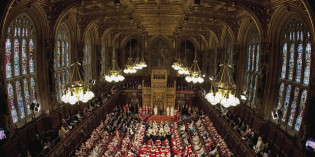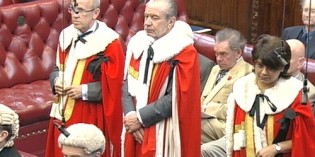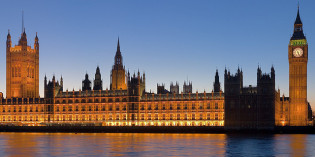Parliament

Time to tackle the growth of the ‘payroll vote’
The number of Members of Parliament who take the ‘Government whip’ has continued to grow. This trend is exacerbated by a larger number of members of the House of Lords who have become Ministers, who escape the kind of scrutiny which we associate with the House of Commons. Stewart Wilks-Heeg argues that is time to […]

Whatever happened to reforming the political system?
In May 2009, as leader of the Liberal Democrats, Nick Clegg announced his 100 day action plan ‘to save British democracy’, ‘take back power’ and ‘change politics for good’. Clegg’s proposals were for an urgent and far-reaching set of political reforms, including fixed-term Parliaments, a mechanism for voters to be able to recall MPs, a referendum on […]

How should ‘political England’ be recognised?
In the newly published IPPR pamphlet The Dog That Finally Barked: England as an Emerging Political Community, Richard Wyn Jones and Guy Lodge demonstrate, to anyone’s satisfaction, that there is such a thing as English identity and that it has a political component. Lewis Baston examines the arguments around the recognition of England as a political entity. […]

Lords reform: the problem of piecemeal constitutional amendment
How far is it possible to carry out piecemeal reform of a constitution when we do not know and cannot agree on the rules governing such amendment, and are not even clear about the nature of the constitution in question? Andrew Blick argues that the difficulties of affecting constitutional change in the UK are particularly […]

What is the UK constitution made of? Exposing the ‘hidden wiring’
Late last year, the Cabinet Office published in draft form a document called the Cabinet Manual. Subtitled ‘A guide to laws, conventions, and rules on the operation of government’, it was initially intended by Gordon Brown, when instigating it as Prime Minister, as a possible first step towards a written constitution for the UK. This plan […]

Reforming the constitution: process matters
Andrew Blick argues that policies impacting significantly on the UK constitution were central to the programme underpinning the formation of the Conservative/Liberal Democrat Coalition in May 2010. They include fixed-term parliaments; a reduction in the number of MPs combined with an equalisation in the population size of parliamentary constituencies; a referendum on AV; and a requirement for […]

The EU Bill is flawed, but it could open up other options for democratic reform
Referendums have become an increasingly important part of the process of constitutional change in the UK. In a constitution historically unreceptive to such devices, referendums have been used to gauge the public’s appetite for continuing membership of the EEC, devolution, changes to the structure of regional and local government, and now, electoral reform. Dr Mike Gordon argues […]

Talking sense on Lords reform: why the PSA’s new Briefing fills a crucial gap
Stuart Wilks-Heeg On 19 May 2010, just weeks after the General Election, the new Deputy Prime Minister, Nick Clegg, promised that the incoming coalition government would preside over ‘a wholesale, big bang approach to political reform’, amounting to ‘the biggest shake up of our democracy since 1832’. It scarcely needs pointing out that, following the […]

What’s happening to our democracy?
Stuart Wilks-Heeg, 28 February 2011 Our fourth Audit of UK democracy, due for publication later this year, deploys International IDEA’s ‘State of Democracy’ assessment framework and is built around 77 separate ‘search questions’. As we consider the huge evidence base which our Audit is generating, however, one ‘overarching’ question which is not part of the framework becomes […]

Reports of Parliament’s decline much exaggerated
Andrew Blick, 31st May 2011 The last decade has seen a series of significant innovations in the way Parliament holds government to account, mostly involving the House of Commons, but in some cases the House of Lords as well. They include: More resources for select committees; The introduction of ‘core tasks’ for select committees in the Commons […]


 Democratic Audit's core funding is provided by the Joseph Rowntree Charitable Trust. Additional funding is provided by the London School of Economics.
Democratic Audit's core funding is provided by the Joseph Rowntree Charitable Trust. Additional funding is provided by the London School of Economics.